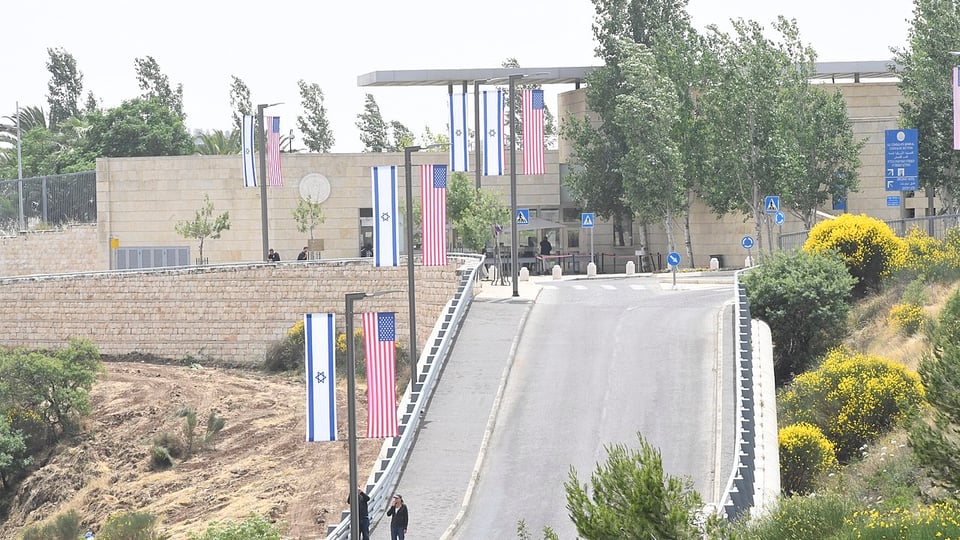What Does the U.S. Embassy Move to Jerusalem Mean?
The U.S. State Department has implemented President Trump’s decision to move the U.S. embassy in Israel to Jerusalem. What does this move mean for the U.S., Israel and the world?

The U.S. embassy in Jerusalem.
On May 14, 1948, the world watched as David Ben-Gurion, one of Israel’s founding fathers and its first prime minister, declared the independence of the newly formed State of Israel. A mere 11 minutes later, U.S. President Harry S. Truman officially recognized Israel, making the U.S. the first nation to do so. The two nations have continued to have close ties ever since.
Formal diplomatic relations with Israel were established less than a year later with the appointment of an ambassador. But the U.S. embassy was located in Tel Aviv. Over the years, the location of the embassy was a source of controversy because Israel declared Jerusalem to be its “eternal capital”—something that was not yet officially recognized by the United States (and most of the world).
A promise of change
It wasn’t until 1995 that the U.S. Congress passed the Jerusalem Embassy Act, which declared that “Jerusalem should be recognized as the capital of the State of Israel.” For the last 23 years, nearly every U.S. president has verbally acknowledged this, but none took the definitive step of moving the embassy.
That all changed last December when President Donald Trump directed the State Department to begin the process of moving the embassy to Jerusalem as soon as possible. This move brought expected condemnation from all over the Arab world. It was also condemned as unnecessarily provocative by other nations like Britain, France, Sweden, Italy and Japan.
The world watches a new embassy open
Nonetheless, on May 14 of this year, 70 years (almost to the minute) after Mr. Ben-Gurion’s declaration of independence, the current U.S. ambassador to Israel, David Friedman, spoke at the opening ceremony of the new embassy building in the city of Jerusalem. In that speech he said:
“Today, we keep our promise to the American people, and we extend to Israel the same right that we extend to every other nation, the right to designate its capital city. A capital city, I should add, which houses all three seats of government, with a 3,000-year-old history dating back to the time when King David made Jerusalem the capital of ancient Israel.”
This move has put Jerusalem once again on the front page of world news. And once again, we see that no one knows how to bring about peace in Jerusalem or virtually anywhere in the Middle East! No matter what choice might be considered—a two-state solution, a divided Jerusalem, going back to the 1948 borders, or other more radical or extreme ideas—none of them will bring about peace.
Will it spark further violence?
As anger, resentment and unrest grow, demonstrations are likely to become more violent.
Just hours after the embassy’s opening, an Iranian terror group known as the Iranian Justice Seeker Student Movement offered a $100,000 reward to anyone who bombs the newly opened embassy. Unfortunately, attacks against diplomats and embassies have been a regular part of terror tactics in the past, so security personnel take such threats very seriously. All one has to do is remember past attacks at embassies and consulates in Benghazi, Beirut, Nairobi and Karachi, just to name a few.
As Israel celebrates the move of the U.S. embassy, tension is growing in other places. In the Gaza Strip, a narrow patch of land between Israel, Egypt and the Mediterranean Sea, thousands of Palestinians struggle with limited basic resources, unemployment as high as 60 percent among young people and a growing sense of hopelessness. They feel as if the world—especially Israel and the U.S.—have abandoned them.
As anger, resentment and unrest grow, demonstrations are likely to become more violent—as they did on the day of the embassy’s dedication. As thousands of Palestinians rushed the border barricades separating Gaza from Israel, Israeli troops opened fire, fatally wounding 60 Palestinians.
The Israeli-Palestinian conflict continues to be the world’s biggest unsolvable problem.
Violence begets violence
Jerusalem, the City of Peace, has inspired anything but peace for most of its 3,000-year history. Current events will only add to the violence and death that history has already recorded.
The prophet Zechariah was inspired to write: “Behold, I will make Jerusalem a cup of drunkenness to all the surrounding peoples, when they lay siege against Judah and Jerusalem. And it shall happen in that day that I will make Jerusalem a very heavy stone for all peoples; all who would heave it away will surely be cut in pieces, though all nations of the earth are gathered against it” (Zechariah 12:2-3).
Only the rule of Jesus Christ will solve the Israeli-Palestinian conflict!
Photo credit:
Flickr.com via flickr2commons
Date Posted: May 29, 2018



